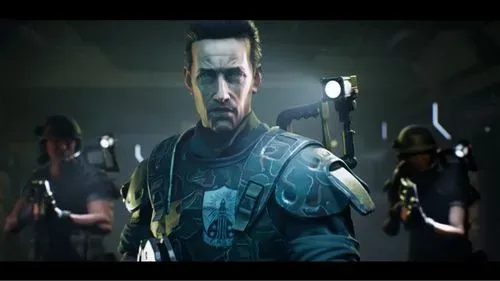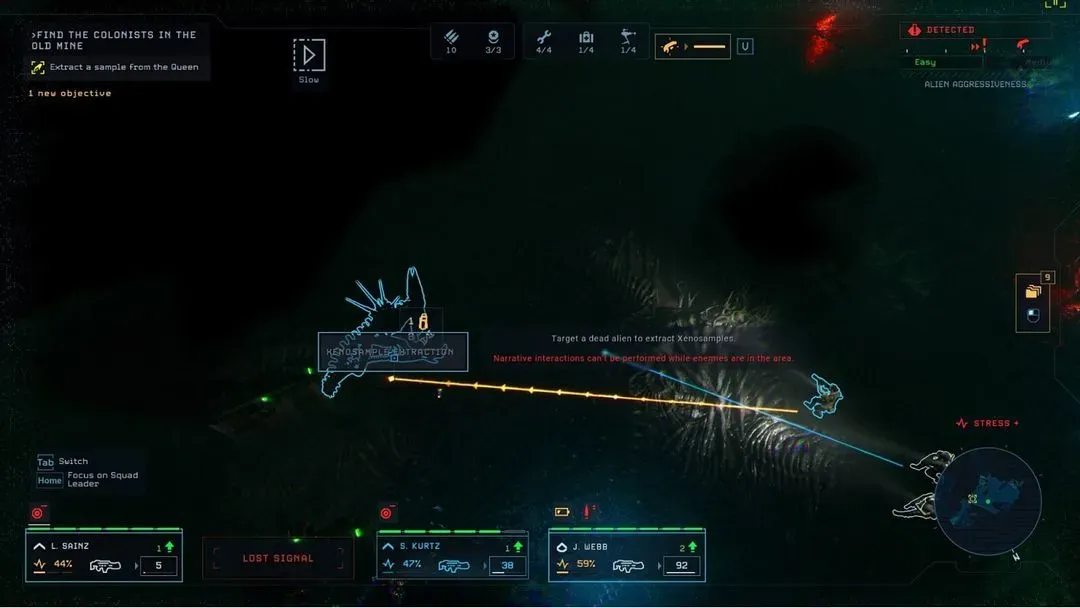PC
PS4
PS5
Xbox One
The first time you boot up Aliens: Dark Descent, you’re greeted with a warning that states the game is difficult. The message says, in so many words, that unlike in most real-time strategy games, your space marines are going to die a lot. Like in the movies that inspired it, the brief bit of text tells you that feeling disheartened and frustrated is an intentional part of the experience. What the warning doesn’t tell you, however, is that the reason you will constantly fail missions and have to backtrack through otherwise atmospheric levels is because of unfair enemies and confusing gameplay mechanics. These elements, then, are what define Dark Descent instead of its gripping Aliens ambience, because at the end of the day, putting a difficulty disclaimer on your game doesn’t make up for dumb gameplay decisions.
Dark Descent is, to be fair, a fun game on paper. You play as the ever omnipresent deity that, like in all strategy games, controls troops in combat and then manages them at base when you complete a mission. Technically, that deity is named Sergeant Jonas Harper or Administrator Maeko Hayes depending on whether or not you’re in the field, but it hardly matters. The game’s characters and narrative are, expectedly for an Aliens game, predictable. After the Weyland-Yutani corporation does what it always does (releases xenomorphs on a developing planet), you’re tasked with taking control of various squads of Colonial Marines to clear the planet, save the day and hopefully make people realise that government-like corporations shouldn’t be trusted, in a campy but otherwise enjoyable enough story.
To do that, you engage in both real-time strategy-based sneaking and shooting in roughly a dozen main campaign missions, in between which you spend time at your ship upgrading facilities and managing troops. This core gameplay loop has been all but perfected by the likes of XCOM, and using that formula in an Aliens game should’ve been a sure-fire success. Completing missions that ooze licensed franchise atmosphere, after which you equip troops with licensed franchise gear has been done before successfully, and it could’ve easily been done with one of the most well-known sci-fi IPs on the planet.

The problem with Dark Descent, however, is that it makes too many changes from the well-established squad-based tragedy game formula. The main differences between it and something like Partisans 1941 aren’t necessarily terrible; the title puts a heavy emphasis on stealth instead of shooting, and commands are issued to your squad instead of individual marines. There’s also a lot of elements that encourage you to simply leave an encounter if it looks like you’re going to fail, like your squad’s mental health meters that can degrade to the point where your marines are combat ineffective but is recharged at base, and the ability to easily send another group of troops where your previous ones left off if you opt to call a mission quits early.
While these things are unique to be sure, and do make Dark Descent a lot more interesting than the likes of the FPS Aliens: Colonial Marines, they also make playing the game an exercise in frustration unless you’re devoted to its genre and franchise. Levels in the game are long, with many taking upwards of two hours to complete, and you’re forced to rely on inconsistent checkpoints instead of quicksaves. You also need to sneak around xenomorphs as often as you can, lest you kill too many and incur the wrath of a horde of the phallic horrors. While, again, you can always just redeploy a fresh team of grunts if your previous one gets killed, it’s not fun to do so. It’s also not fun to run out of ammunition or quest-essential items, to get killed by an enemy that takes dozens of your limited bullets to down, or to lose a high level combat troop to a facehugger that’s nigh-impossible to kill, and all three of these things happen frequently.
These elements, and the game’s other differences from the aforementioned XCOM, also put Dark Descent in a weird spot genre-wise. Because you can’t control the actions of individual marines, the fact that levels are often linear-ish with plenty of pre-scripted set pieces, and the lack of any ability to really manoeuvre tactically around those maps, the game often feels more like an action RPG than it does a tactics title. However, its punishing difficulty, progression mechanics and the skills your squad can use are staples of the RTS genre. This means that playing the game elicits the same feeling as playing the weird third-person shooter/squad strategy game The Bureau: XCOM Declassified, wherein you’re never getting the full strategy game experience, but you also aren’t able to chill out with a dumb popcorn entertainment action game, either.
Admittedly, whatever genre Dark Descent is part of does certainly nail the atmosphere of Aliens when combined with graphically beautiful environments. Getting “game over, man” (game over)’d because of something stupid is a big part of the franchise’s appeal, and it’s one that no other Aliens game has really capitalised on. Slowly crawling through xenomorph-infested caves and then engaging in a last stand against waves of ugly bugs with what’s left of a squad that should probably have been dead an hour ago is the most Aliens thing imaginable. But the problem is that it’s only worth having that experience if you’re willing to accept that you’ll need to re-deploy and re-equip another squad in a few minutes to actually complete your laboriously long mission.

To be clear, there’s nothing wrong with difficult games that kill off you or your troops to instil a sense of dread. The Dark Souls games, Darkest Dungeon, and Dead Space are all a testament to that fact, but unlike Dark Descent, those games aren’t genre-confused and don’t have a laundry list of frustrating gameplay mechanics. While Dark Descent is one of the better Aliens games, for what little that’s saying, and is worth buying if for no other reason than to forget about the equally genre-confused Alien: Isolation, you could also just buy a bottle of scotch and rewatch the movies on Amazon. And, for our money, that’d be the better call, because at least the scotch doesn’t come with a disclaimer about how hard it will be to finish.
You can subscribe to Jump Chat Roll on your favourite podcast players including:
Let us know in the comments if you enjoyed this podcast, and if there are any topics you'd like to hear us tackle in future episodes!



